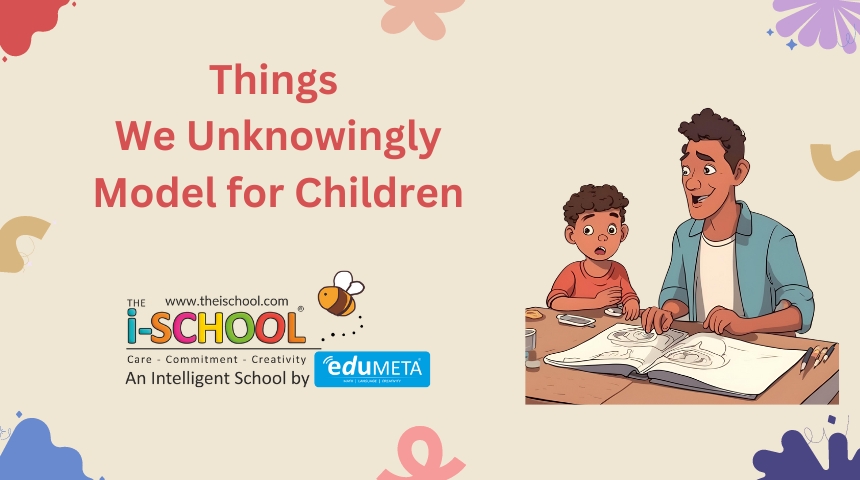Things We Unknowingly Model for Children

As parents and caregivers, we play a crucial role in shaping our children’s behavior and attitudes. While we often focus on deliberate teaching and guidance, many of the lessons children learn come from observing our actions, words, and habits. Here are some things we unknowingly model for our children and the impact they have on their development.
1. Communication Style
How We Speak:
- Children pick up on our tone of voice, choice of words, and body language. If we communicate with kindness, respect, and patience, they are likely to mimic these behaviors.
- Conversely, if we frequently use harsh or negative language, they may adopt similar communication patterns.
Impact:
- Encourages positive and respectful interactions
- Helps develop effective communication skills
- Reduces instances of conflict and misunderstanding
2. Emotional Regulation
Handling Emotions:
- Our responses to stress, frustration, and disappointment serve as models for our children. Demonstrating healthy coping mechanisms, such as taking deep breaths or discussing feelings calmly, teaches them how to manage their own emotions.
- Overreacting or expressing anger inappropriately can lead to similar behaviors in children.
Impact:
- Promotes emotional intelligence and resilience
- Fosters a calm and supportive home environment
- Reduces behavioral issues related to poor emotional regulation
3. Attitudes Toward Learning
Learning Attitude:
- Children observe our attitudes toward education and learning. Showing enthusiasm for learning, reading, and exploring new ideas can instill a love of learning in them.
- Expressing negative attitudes towards education or avoiding intellectual challenges may discourage them from pursuing academic excellence.
Impact:
- Encourages a lifelong love of learning
- Promotes curiosity and intellectual growth
- Sets a positive example for academic achievement
4. Work Ethic
Approach to Work:
- Our work habits, such as diligence, punctuality, and responsibility, are often mirrored by our children. Demonstrating a strong work ethic can inspire them to adopt similar values.
- Showing a lack of commitment or procrastination can negatively influence their approach to tasks and responsibilities.
Impact:
- Fosters a sense of responsibility and discipline
- Encourages perseverance and dedication
- Prepares children for future academic and professional success
5. Health and Wellness Habits
Lifestyle Choices:
- Children observe our eating habits, exercise routines, and overall approach to health and wellness. Modeling healthy behaviors, such as eating nutritious foods and staying active, encourages them to adopt similar habits.
- Poor dietary choices and a sedentary lifestyle can lead to unhealthy behaviors in children.
Impact:
- Promotes physical health and well-being
- Encourages a balanced and active lifestyle
- Reduces the risk of developing unhealthy habits
6. Conflict Resolution
Handling Disputes:
- Our methods of resolving conflicts, whether with our spouse, family members, or friends, serve as a blueprint for our children. Demonstrating constructive conflict resolution techniques, such as active listening and compromise, teaches them how to handle disagreements effectively.
- Engaging in frequent arguments or using aggressive tactics can negatively impact their approach to conflict.
Impact:
- Promotes peaceful and effective conflict resolution
- Reduces instances of aggressive behavior
- Helps children develop strong interpersonal skills
7. Attitude Toward Technology
Technology Use:
- Our behavior regarding technology use, including screen time, social media engagement, and digital etiquette, sets an example for our children. Balanced and mindful use of technology encourages them to develop healthy tech habits.
- Excessive or inappropriate use of technology can lead to similar behaviors in children.
Impact:
- Encourages balanced and responsible technology use
- Reduces the risk of tech addiction
- Promotes mindful and productive use of digital devices
8. Social Interactions
Interacting with Others:
- Children learn social behaviors by observing our interactions with others. Demonstrating kindness, empathy, and respect in our relationships teaches them to value and practice these qualities.
- Negative social behaviors, such as rudeness or intolerance, can be mirrored by children.
Impact:
- Fosters positive social skills and relationships
- Encourages empathy and understanding
- Reduces social conflicts and promotes inclusivity
9. Financial Habits
Managing Money:
- Our approach to managing finances, including budgeting, saving, and spending, influences our children’s financial habits. Demonstrating responsible financial behavior teaches them the importance of financial literacy and management.
- Poor financial habits, such as impulsive spending or neglecting savings, can negatively impact their financial understanding.
Impact:
- Promotes financial responsibility and literacy
- Encourages saving and smart spending habits
- Prepares children for future financial independence
Conclusion
As parents and caregivers, it’s essential to be mindful of the behaviors and attitudes we model for our children. Our actions, often more than our words, shape their understanding of the world and influence their development. By consciously demonstrating positive behaviors and attitudes in communication, emotional regulation, learning, work ethic, health, conflict resolution, technology use, social interactions, and financial management, we can help our children develop the skills and values they need to thrive. Remember, our children are always watching and learning from us, so let’s strive to be the best role models we can be.
